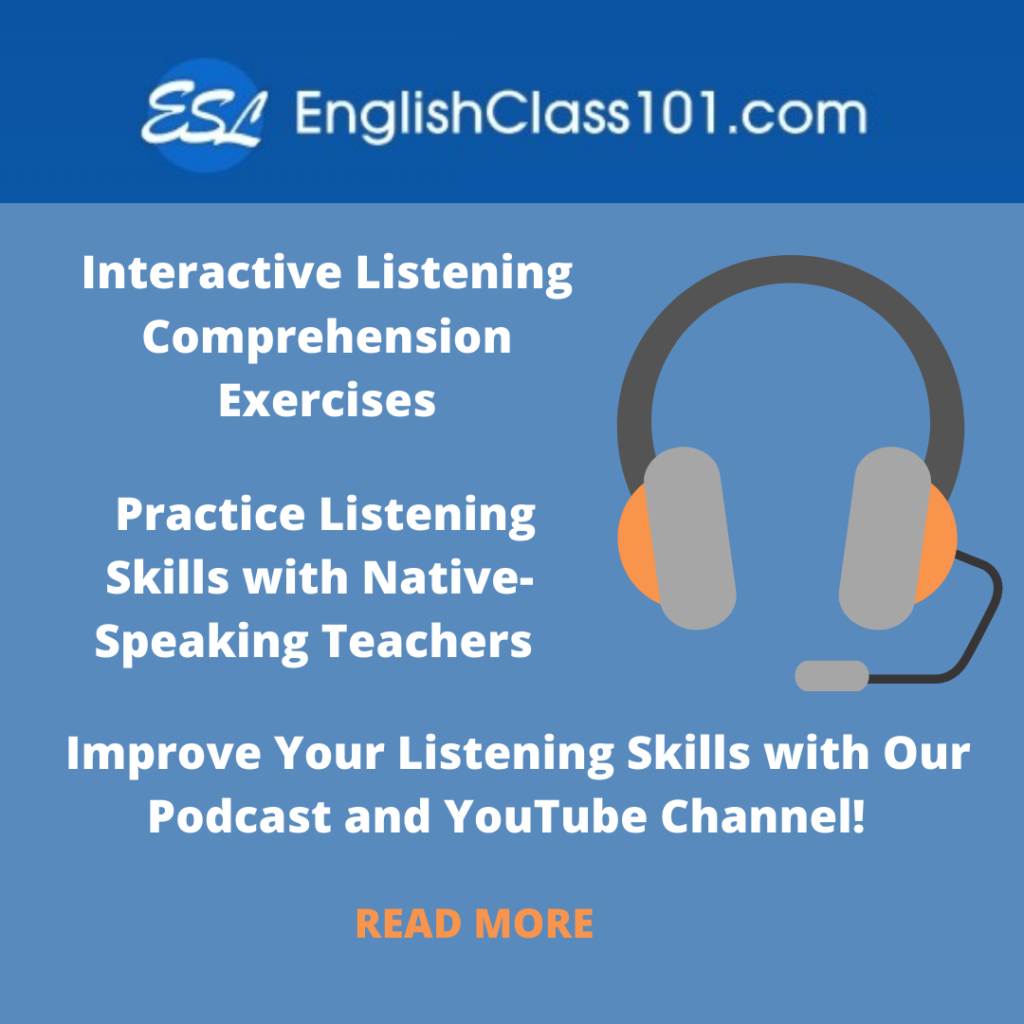
Share this page
Improve Your English Listening Skills by Reading Along
Learning English as a Foreign Language (EFL) presents unique challenges that require creative learning strategies. The most effective strategy to improve your English listening skills is by combining listening and reading:
- listening to movie dialogues while reading the subtitles/captions
- listening to songs while reading the lyrics
- listening to audio-books while reading the text
Reading along as you listen creates a solid connection in your mind between the way native speakers pronounce words and how those words are represented in writing. Whenever possible, you should read out loud as you listen so that you can adjust your pronunciation. Once you have mastered the spelling aspect of the content, you may practice by just listening while visualizing the words as they would be written.
English Listening Skills for a Specific Country
If you plan to work or study in a specific English-speaking country, you should of course focus on getting used to the way English is spoken there. For instance, there are significant differences between the way people speak in Los Angeles and London. The main differences are in word choice and accent.
Word Choice. Whether you are in New Zealand, Canada, the US, Australia or the UK, it’s advisable to familiarize yourself with the local colloquialisms and idiomatic expressions to improve your level of listening comprehension. This table shows some examples of differences in vocabulary between British English and American English.

| British English | American English |
|---|---|
| aluminium | aluminum |
| brilliant (That’s brilliant!) | great (That’s great!) |
| football | soccer |
| mean | stingy |
| a lift | an elevator |
| a lorry | a truck |
| a rubber | an eraser |
| trainers (sports shoes) | sneakers |
| a bloke | a guy |
| the bonnet (of a car) | the hood |
| the boot (of a car) | the trunk |
Accent. The main differences will be in the pronunciation of the consonant “r” and some vowels. For example, words with a final “r” (such as water, doctor, future) are pronounced quite differently in the UK and the US. Certain vowels such as “a” and “o” are pronounced differently, too:
- talk (walk, stalk, etc.)
- tall (fall, hall, etc.)
- pass (mass, class, etc.)
- pot (hot, spot, etc.)
In summary, it’s important to take into account word choice & accent when selecting the source of your learning material.
Practice Listening to “Relaxed Pronunciation”
Native speakers in all English-speaking countries often use reduced forms of speech also known as relaxed pronunciation. For instance, the phrase “want to” is often pronounced as “wanna”, “going to” as “gonna” and “have got to” as “gotta”.
In addition, certain words are difficult for learners to understand because they are pronounced differently in different English-speaking countries. For example, American speakers tend to pronounce the “t” sound as a “d” sound in certain words: “metal” sounds like “medal”, “petal” sounds like “pedal” and “latter” sounds like “ladder”.
Select Suitable Material To Practice English Listening Skills

You can get started right away by making a list of songs, movies, TV series, documentaries, lectures, audio-books, etc. that you can either purchase or access on the Internet. In your playlist, include only the listening material that has text (lyrics, subtitles or print) and that you think may have value for you to learn.
Not all material is suitable for learning, especially if it contains excessive slang, abstract poetry or vocabulary that you will probably never use. Of course, it’s up to you to determine which material is worth learning and which is not.
Examples of Source Material to Practice English Listening Skills
Here are some examples of songs which contain vocabulary and grammar structures that are commonly used.
| GENRE | TITLE | SAMPLE |
| Pop | How Deep is Your Love * | video w/lyrics |
| Rock | Right Now | video w/lyrics |
| Bossa Nova | The Girl From Ipanema | video w/lyrics |
Here are some examples of movies (including series, TV shows and documentaries) which contain vocabulary and grammar structures that are commonly used.
| TYPE | TITLE | SAMPLE |
| Movie | Notting Hill | subtitled scene |
| TV Show | Friends | subtitled scene |
| Documentary | Cosmos | subtitled scene |
Here are some examples of audio books which contain vocabulary and grammar structures that are commonly used.
| GENRE | TITLE | SAMPLE |
| Fantasy | Beauty and the Beast | audio w/text |
| Adventure | Robinson Crusoe | audio w/text |
| Horror | Dracula | audio w/text |
Improve Your Listening Comprehension by Immersion
Learning English while living in an English-speaking country (i.e. learning English as a Second Language, or ESL) would be the first choice for most people who want to improve their English language skills in general and listening skills in particular.
An affordable and convenient way to practice your listening skills with native speakers!
An alternative to living in an English-speaking country or online learning is to take a full-immersion course at a local language school. Although it is an option that not everyone can afford, practicing conversation and role plays for 6 hours a day with a private language instructor really does sharpen your listening comprehension skills!
Practice Listening Skills Daily
Even if you are unable to live in an English-speaking country or cannot afford a full-immersion course, you can still make much progress in improving your English listening skills if you implement the recommended strategy on a daily basis. Your sustained effort is a crucial factor in achieving your long-term language-learning goals, especially when it comes to listening comprehension.
Click here to go to an affiliated online school which features listening comprehension sessions with native speakers: English Class 101.
Additional Benefits of Combining Listening & Reading
Research has shown that by combining reading and listening, learners can expand their vocabulary and improve their understanding of grammar; in addition, learners can practice their pronunciation by reading out loud or singing along.
Note to Teachers
The combined listening and reading strategy presented here is based on Dr Stephen Krashen’s decades-long research which asserts that second language learning is greatly facilitated by reading extensively in the target language 1… reading as comprehensible language input 2 promotes substantial gains in vocabulary retention, spelling accuracy and grammar usage.
1 “The Power of Reading” by Dr Stephen Krashen (see reader reviews)
2 As distinct from language intake.
See Dr Krashen’s full paper from the 2004 RELC Conference held in Singapore: “Free Voluntary Reading: New Research, Applications, and Controversies“
Share this page

